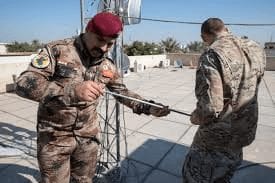Trump’s Fatal Mistake: Killing Soleimani vs. Countering ISIS – By Luke Hartig (justsecurity.org ) / Jan 6 2020
The fight against ISIS is on hold. It’s unclear how exactly it will ever resume. With U.S. and coalition forces hunkered down in anticipation of Iranian retaliation for the killing of Qassem Soleimani and the Iraqi parliament calling for the withdrawal of U.S. troops from the country, combined with continued fallout from President Trump’s decision to withdraw from parts of Syria, our counterterrorism campaign is deeply compromised. And running across all of this is the same dynamic – a president who knows very little about how to wage counterterrorism and cares not at all about setting the diplomatic conditions to achieve our goals against ISIS, al-Qaeda, and other terrorist groups. Counterterrorism is about much more than dropping bombs and training partners, and unless the President or somebody in his administration shows some diplomatic savvy in a hurry, our campaign against ISIS in the region is, for most all intents and purposes, over.
When it began in 2014, the counter-ISIS campaign was designed to specifically avoid many of the mistakes of the previous 13 years of counterterrorism. It would use a small footprint rather than a large occupation, relying on local partners with small teams of embedded advisors, airstrikes, and occasional commando raids to defeat ISIS. It would demand much of the government of Iraq, calling on them to both contribute to the fight and address longstanding political grievances among Iraq’s factions. (The latter corrected for oversights within the earlier years of the Obama administration.) It would rely on local partners in Iraq and Syria, who would have the on the ground knowledge and relationships to create durable gains. It would call for carefully managing regional relationships to ensure conflicts and grievances didn’t disrupt the campaign. And it would be built on an unprecedented coalition of more than 70 nations – from traditional allies to regional powers. As compared to the previous U.S. campaign in Iraq and the ongoing campaign in Afghanistan, it would be more legitimate, encourage partners to shoulder more of the load, and claim less U.S. lives and treasure.
This was always a delicate strategy that required constant tending. Successive U.S. Special Envoys for the Global Coalition to Counter ISIS flew around the world, asking partner nations to contribute more to the fight. U.S. diplomats in Baghdad and officials in Washington urged the Iraqi government to remain committed to the fight while carefully addressing their political concerns. And U.S. officials did as careful a dance as possible in aiding the Syrian Defense Forces, a primarily Kurdish sub-state group operating in an Arab country and right on the doorstep of Turkey.
What we, as a national security community across different administrations, learned in tending the counter-ISIS campaign was essentially an amplified version of what we have learned everywhere else since 9/11: Effective counterterrorism policy is about much more than conducting drone strikes and deploying commandos; it’s about setting the diplomatic and geopolitical conditions for counterterrorism to succeed. For example, our efforts against al-Qaeda and the Taliban in Afghanistan have risen and fallen based on how well we could convince or pressure the Pakistani government into combating the militants in its border regions. When we failed to generate enough international support for the fledgling government in Yemen, what had been a strong counterterrorism partner in the fight against al-
Qaeda fell to Houthi rebels. The gains made against al-Shabaab are a result of diplomatic efforts and military assistance designed to stiffen the spine of African Union partners shouldering most of the fight in Somalia. Terrorists in the Sahel have been contained because of rigorous collaboration and modest assistance to the French combined with patient work to bolster regional partners.
I take no pleasure in observing that President Trump apparently fails to grasp the importance of any of this foreign policy work when it comes to ISIS. For him, the entirety of the counterterrorism campaign reduces to dead terrorists. An irony is that he seems oblivious to the idea that even the high-profile terrorist deaths he craves are only possible if the conditions are properly set. While Trump’s desire to rid himself of the complexities of Iraq and Syria has been apparent from early on, it’s only recently, as his national security team has turned into a skeleton staff of true believers, that he has been allowed to put his ignorance into action. First was his quick decision in October to abruptly withdraw from northern Syria and abandon our Kurdish partners to the Turks. Partners who had carried the load in the ground campaign against ISIS, and suffered massive casualties in the process, fled for their lives, ISIS fighters escaped from prisons, and the United States lost its ability to do much of any counterterrorism in critical parts of Syria. A small force has since abruptly returned and now remains in Syria, ostensibly to protect oil fields. U.S. Central Command insists that these forces are capable of conducting counterterrorism operations, but a blistering Inspector General report notes extensive shortfalls in counter-ISIS capabilities in Iraq following the Turkish incursion and cites Defense Intelligence Agency officials as assessing that ISIS will now rebuild and attempt to free its prisoners as part of the chaos left in the wake of the Turkish offensive.
Continue to article: https://www.justsecurity.org/67927/trumps-fatal-mistake-killing-suleimani-vs-countering-isis/




















